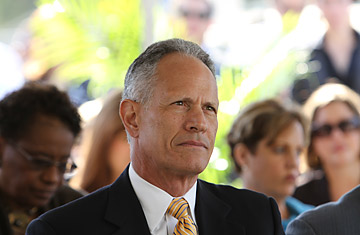
Miami-Dade County Mayor Carlos Alvarez
Politicians often do the right thing wrongly. Democrats are mistaken to think we can stanch our hemorrhaging budgets without cutting entitlements, but Republicans are just as delusional to suggest it can be done without raising taxes. Carlos Alvarez, the Republican mayor of Miami-Dade County, or greater Miami, understood this. And so, staring at the revenue free fall caused by South Florida's housing collapse, he engineered a property-tax increase last year to plug a near half-billion-dollar budget hole and keep critical departments like fire and police from being, as he said, "gutted."
Problem was, taking that step during the Great Recession, when Miami-Dade unemployment was approaching 13%, meant that you and your administration better be models of fiscal responsibility. But it turned out that Alvarez, one of the few Miami politicos with a reputation for probity, was at the same time raising high-level staffers' salaries as high as 15% while calling for a 5% cut for county workers; he also used his government car allowance to help pay for a new luxury BMW 550i Gran Turismo. Couple that with the fact that the Miami-Dade County Commission, which passed Alvarez's tax hike, is widely considered a feckless body — many of its members recently ran up hundreds of thousands of dollars in police overtime costs with the all-too-common practice of using cops as their personal chauffeurs — and you can expect a bruising backlash.
It looks like that's coming on March 15, when Alvarez will face a recall vote. "We've all been complaining about the quality of our government for a long time, and now we finally have a chance to do something about it," said Norman Braman, the Miami billionaire who led the recall-petition drive, after casting his anti-Alvarez ballot when early voting opened last week. Polls indicate that Alvarez probably won't be parking his beemer in the mayor's downtown-Miami space much longer. According to a March 6 Bendixen survey, 67% of Miami-Dade voters want to dump him. And when and if they do, Miami and its dysfunctional civics are likely to become a new rallying point for the antigovernment wave that swept so many ultra-conservative candidates — including Florida's controversial new governor, Rick Scott — into office last year.
The fall of Alvarez, who was first elected in 2004, would be resounding. Before the recession hit, he was riding high: Miami's housing boom was like a never-ending South Beach party, and in 2007 he won a referendum that gave the mayor, occupying a then relatively weak post, broad new powers that residents hoped would check the incompetent county commission. (Alvarez aides say that was the reason for the staff raises: the new mayoral powers thrust additional duties on the office.)
But though he handily won re-election in 2008, Alvarez may have overestimated Miami-Dade's new mayoral mandate as the recessionary hurricane bore down on South Florida. Even his accomplishments soon came under critical scrutiny, including the deal he and the county commission inked with the Florida Marlins for a new downtown baseball stadium, which in many respects now looks like a sweeter arrangement for a fat-cat sports franchise than for a struggling, low-wage county. Meanwhile, the 13-member county commission remains as clueless as ever. It hardly blinked, for example, when the Miami Herald last fall reported that Commissioner Jose "Pepe" Diaz is the director of a construction firm hired to do work at Miami International Airport, which is overseen by the commission. Diaz claims he never directly voted to give the firm contracts, but the Herald found that companies that have won airport concessions have in turn employed his firm.
All of which was too much for Braman and other Alvarez critics, who were able to secure almost twice the number of petition signatures needed to force a mayoral recall vote. Commissioner Natacha Seijas, who reportedly warned a political rival in 2002 during a debate that she'd "leave here in a body bag," also faces a recall, and four other commissioners may confront one soon. After exhausting his appeals to nullify the petition last month, Alvarez curtly stuck by his fateful tax-increase decision. "I recommended a budget that preserves services," he said.
But he did it, as far as many if not most Miamians are concerned, while he and the county commission preserved their privileges. In the process, they handed more leverage to controversial watchdogs like Braman — who, as an owner of car dealerships, has used his financial clout to kill sales-tax levies for badly needed public-transportation improvements in Miami. If Alvarez and Seijas (who voted with seven other commissioners for the property-tax hike) are toppled on March 15, their political tone-deafness will only have made it harder for the next politician to do the right thing when it's warranted.
